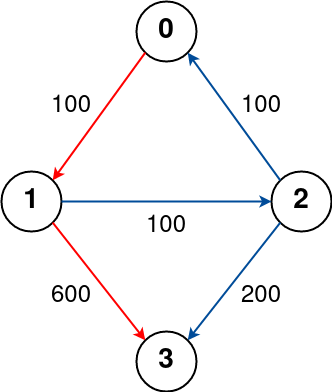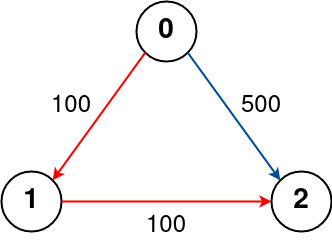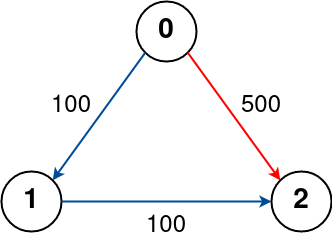Problem
There are n cities connected by some number of flights. You are given an array flights where flights[i] = [fromi, toi, pricei] indicates that there is a flight from city fromi to city toi with cost pricei.
You are also given three integers src, dst, and k, return **the cheapest price from src to dst with at most k stops. If there is no such route, return **-1.
Example 1:

Input: n = 4, flights = [[0,1,100],[1,2,100],[2,0,100],[1,3,600],[2,3,200]], src = 0, dst = 3, k = 1
Output: 700
Explanation:
The graph is shown above.
The optimal path with at most 1 stop from city 0 to 3 is marked in red and has cost 100 + 600 = 700.
Note that the path through cities [0,1,2,3] is cheaper but is invalid because it uses 2 stops.
Example 2:

Input: n = 3, flights = [[0,1,100],[1,2,100],[0,2,500]], src = 0, dst = 2, k = 1
Output: 200
Explanation:
The graph is shown above.
The optimal path with at most 1 stop from city 0 to 2 is marked in red and has cost 100 + 100 = 200.
Example 3:

Input: n = 3, flights = [[0,1,100],[1,2,100],[0,2,500]], src = 0, dst = 2, k = 0
Output: 500
Explanation:
The graph is shown above.
The optimal path with no stops from city 0 to 2 is marked in red and has cost 500.
Constraints:
1 <= n <= 1000 <= flights.length <= (n * (n - 1) / 2)flights[i].length == 30 <= fromi, toi < nfromi != toi1 <= pricei <= 10^4There will not be any multiple flights between two cities.
0 <= src, dst, k < nsrc != dst
Solution (Java)
class Solution {
public int findCheapestPrice(int n, int[][] flights, int src, int dst, int k) {
// k + 2 becase there are total of k(intermediate stops) + 1(src) + 1(dst)
// dp[i][j] = cost to reach j using atmost i edges from src
int[][] dp = new int[k + 2][n];
for (int[] row : dp) {
Arrays.fill(row, Integer.MAX_VALUE);
}
// cost to reach src is always 0
for (int i = 0; i <= k + 1; i++) {
dp[i][src] = 0;
}
// k+1 because k stops + dst
for (int i = 1; i <= k + 1; i++) {
for (int[] flight : flights) {
int srcAirport = flight[0];
int destAirport = flight[1];
int cost = flight[2];
// if cost to reach srcAirport in i - 1 steps is already found out then
// the cost to reach destAirport will be min(cost to reach destAirport computed
// already from some other srcAirport OR cost to reach srcAirport in i - 1 steps +
// the cost to reach destAirport from srcAirport)
if (dp[i - 1][srcAirport] != Integer.MAX_VALUE) {
dp[i][destAirport] = Math.min(dp[i][destAirport], dp[i - 1][srcAirport] + cost);
}
}
}
// checking for dp[k + 1][dst] because there are 'k + 2' airports in a path and distance
// covered between 'k + 2' airports is 'k + 1'
return dp[k + 1][dst] == Integer.MAX_VALUE ? -1 : dp[k + 1][dst];
}
}
Explain:
nope.
Complexity:
- Time complexity : O(n).
- Space complexity : O(n).